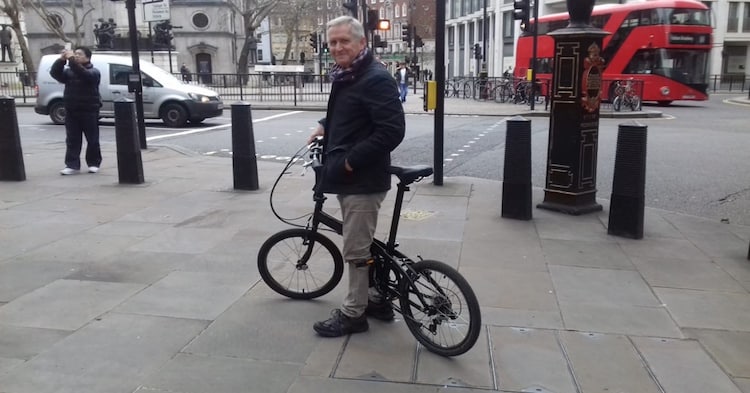My fold-up is my essential mobility device
My name is Mike. In recent years, my ability to take part in physical activity, including walking, has been much reduced. I have arthritis in my lower limbs and in the not too distant future surgical intervention will be required.
When compared to other stories on this website my situation is really at the bottom of the scale. There are so many people in a far worse situation than mine. Having said that, I can barely walk; I can lie, sit, and stand mostly without pain, but my walking range is reduced to a shuffle of 20-30 metres at most – and that is not painless. Any longer is borderline impossible for me, whilst slopes and uneven ground pose further difficulties.
But I don’t want – or need – a walker, mobility scooter or wheelchair. I can still ride a bike! I have ridden bikes for most of my life. A standard bike with a crossbar is now a challenge for me, but last year I bought a small-wheeled, step-through, fold-up bike. It has been brilliant. I cannot leave the house without it. I take it in the car, on the bus, the train and, once dismantled, it will fit into a suitcase for the plane.

The fold-up, with its small wheels, is highly manoeuvrable, low to the ground, and not fast. On pathways I am at the same height as pedestrians, and so do not present a threat of collision. The downside is that there are restrictions as to where I can go: I should not cycle on pavements and cannot access many pathways, parks, shopping precincts or malls, whilst other no-go areas include pedestrian tunnels and bridges; the grounds of National Trust properties; airports; rail stations; the Tube; archaeological sites; restaurants; and pathways to sports stadiums. I am not even allowed to store my fold-up at the entrance to the National Gallery, but must leave it at a bike stand across Trafalgar Square, then shuffle to the entrance. The list goes on…
Understandably, there are “No Cycling” regulations in many restricted areas. But am I a ‘normal’ cyclist, and should there be some form of exemption for those with similar constraints to me?
This small bike is my essential mobility device:
Without it – I am denied entry as I am virtually unable to walk. All of the areas listed above are currently a no-go for me. It’s a form of discrimination.
With it – I have been stopped and ejected by park attendants, security staff, wardens and police on many occasions. Every time, I am unable to respond to the statement: “The Rules is The Rules!”
So for me, some form of official and recognisable identification, which evidences my dependence on my wheeled device and leads to an increased awareness of my difficulty, would be a real help. Persuading officialdom to change is an uphill battle, and I wholeheartedly commend Wheels for Wellbeing for taking up the challenge.
